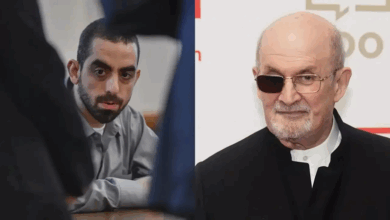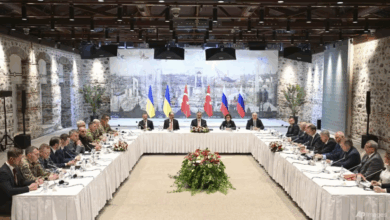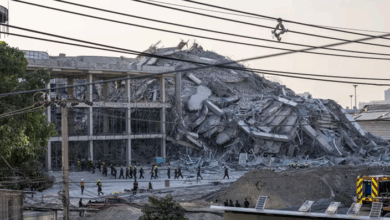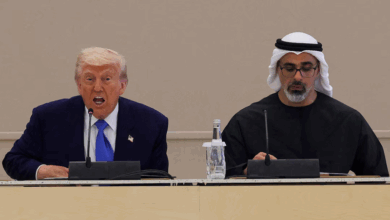Libyan protesters demand prime minister quit as three ministers resign
News Mania Desk / Piyal Chatterjee / 17th May 2025
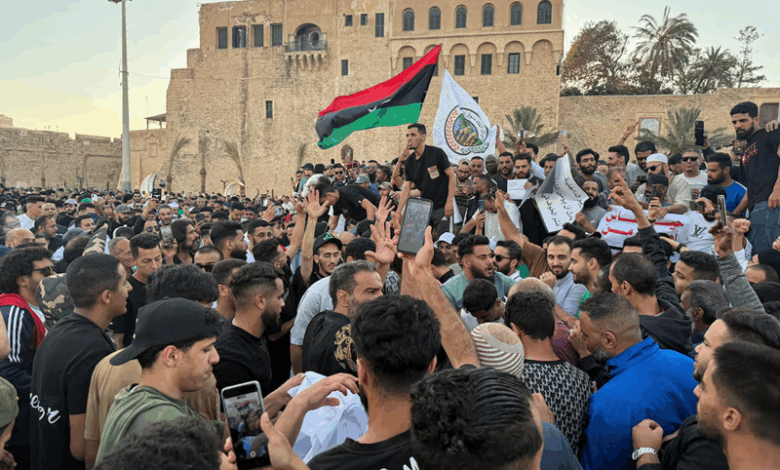
On Friday, hundreds of Libyan demonstrators demanded the removal of the internationally-recognized prime minister, and a representative from the security forces reported that one member was killed during an attempt by some protesters to breach his office.
At least three ministers stepped down in solidarity with the demonstrators, who are calling for Prime Minister Abdulhamid Dbeibah to resign. The protesters assembled in Martyrs’ Square in Tripoli, shouting phrases like “The people demand the government’s downfall” and “We seek elections.”
The protesters held images of Dbeibah, national security advisor Ibrahim Dbeibah, and Interior Minister Emad Tarbulsi, all with their faces marked out in red.
The state-owned oil company NOC announced in a statement that its activities at oil facilities are running smoothly, and that oil and gas exports continue to function routinely. In the last 24 hours, the national oil production reached 1,376,415 barrels.
Dbeibah, at the helm of the fractured nation’s Government of National Unity, assumed leadership via a UN-supported procedure in 2021. Elected elections did not take place that year due to conflicts between competing groups, and he has continued to maintain his position.
The government media outlet declared in a statement that a member of its security team tasked with building protection was killed, sharing video clips that depicted the fence of the building damaged, with stones scattered on the ground. On Friday, businessman Wael Abdulhafed remarked: “We are (here) today to voice our outrage towards Dbeibah and all those in power for years now who hinder elections.” “They need to relinquish power.”
Demands for Dbeibah’s resignation grew following a clash between two opposing armed groups in the capital this week, marking the most intense fighting in years. According to the United Nations, eight civilians lost their lives.
Violence erupted after the prime minister instructed the armed groups to disband on Tuesday. Protesters have charged Dbeibah with not achieving stability and with being complicit in the rising power.
On Friday, Economy and Trade Minister Mohamed al-Hawij, Local Government Minister Badr Eddin al-Tumi, and Housing Minister Abu Bakr al-Ghawi stepped down. Militia chief Abdulghani Kikli, popularly referred to as Ghaniwa, was killed in the fighting, which eased on Wednesday when the government declared a ceasefire.
The United Nations Support Mission in Libya voiced its apprehension regarding the rise in violence in Tripoli, urging involved parties to implement necessary actions to safeguard civilians and public assets.
Libya has experienced minimal stability since the 2011 NATO-supported revolt that removed longtime dictator Muammar Gaddafi. The nation divided in 2014 between competing eastern and western groups, although significant hostilities ceased with a ceasefire in 2020.
For the past ten years, commander Khalifa Haftar and his Libyan National Army have held sway over eastern Libya, while authority in Tripoli and western Libya has been fractured among various armed groups.
The primary oil installations in the leading energy exporter are situated in southern and eastern Libya, away from the combat in Tripoli. Engineers at multiple oil fields and export terminals informed Reuters that production was not impacted by the conflicts.



